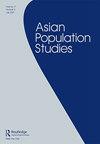转型期的主观预期寿命:对韩国婴儿潮一代的纵向研究
IF 1.5
4区 社会学
Q2 DEMOGRAPHY
引用次数: 1
摘要
主观预期寿命预测实际死亡率,并提供个体时间框架。这项对韩国中年婴儿潮一代进行的为期四年的纵向研究考察了随着人们年龄的增长,主观预期寿命是如何变化的,以及健康和社会经济地位的变化是如何导致这些变化的。与基于人口的精算预期寿命相比,50多岁的男性高估了自己未来的寿命1.2年,而女性低估了4.1年。随着婴儿潮一代年龄的增长,主观预期寿命也在增加。固定效应回归分析表明,主观寿命随已知健康和死亡因素的变化而变化。社会经济资源的增加预测主观预期寿命的增加,而吸烟或健康状况恶化导致主观预期寿命的减少。一般来说,婴儿潮时期出生的人会根据健康和死亡率之间的既定关系,对自己未来的寿命形成理性的预期。然而,女性对预期寿命的低估引起了社会对长寿风险的关注。本文章由计算机程序翻译,如有差异,请以英文原文为准。
Subjective life expectancy in transition: a longitudinal study of Korean baby boomers
ABSTRACT Subjective life expectancy predicts actual mortality and provides individual timeframes. This four-year longitudinal study on Korean baby boomers in middle age examines how subjective life expectancy changes as people get older and how changes in health and socioeconomic status cause these shifts. Compared to population-based actuarial life expectancies, men in their fifties overestimated their future longevity by 1.2 years and women underestimated by 4.1 years. Subjective life expectancy increased as the baby boomers aged. The fixed effects regression analyses showed that subjective longevity changed along with known health and mortality factors. An increase in socioeconomic resources predicted an increase in subjective life expectancy, while smoking or health deterioration led to decrease. Generally, baby boomers form rational expectations on their future longevity based on established correlates of health and mortality. However, women’s underestimation of life expectancy warrants social concern on longevity risk.
求助全文
通过发布文献求助,成功后即可免费获取论文全文。
去求助
来源期刊

Asian Population Studies
DEMOGRAPHY-
CiteScore
3.30
自引率
14.30%
发文量
12
期刊介绍:
The first international population journal to focus exclusively on population issues in Asia, Asian Population Studies publishes original research on matters related to population in this large, complex and rapidly changing region, and welcomes substantive empirical analyses, theoretical works, applied research, and contributions to methodology.
 求助内容:
求助内容: 应助结果提醒方式:
应助结果提醒方式:


